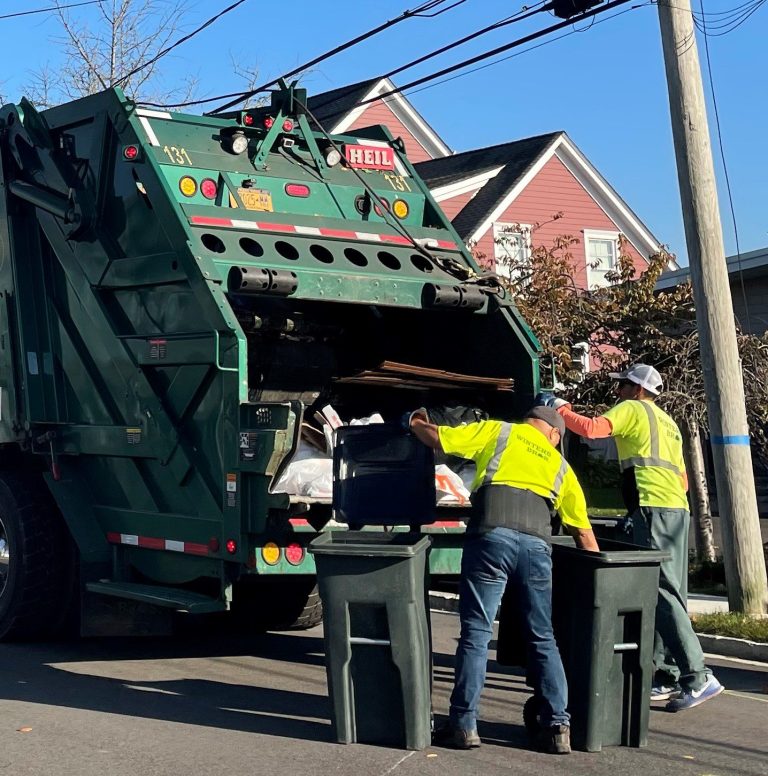
Some 14 million pounds of municipal waste are generated each day on Long Island, and every week residents put their garbage bins on the curb so that trash can disappear.
With the expected closure of the Brookhaven Landfill in 2024, Long Island’s waste has one less place to go. The landfill currently accepts about 1.2 million tons of trash per year, and when it closes, about 60,000 trucks will be needed to handle the excess waste, according to a report from Winters Bros. Waste Systems – a Long Island-based waste management company.
“The fact that the Brookhaven Landfill is going to close isn’t a crisis,” said Will Flower, senior vice president of Winters Bros. It is only a problem if the government, private sector and regulatory bodies are unable to devise a method of handling the trash, he explained.
“If we don’t plan for the management of solid waste, it just isn’t going to go away by itself,” Flower said. “There has to be a system in place to properly manage society’s waste. And that system is, in fact, very complex.”
Winters Bros. released a report called The State of Waste to introduce a plan that would allow this complex system to work as smoothly as possible even after the closure of the Brookhaven Landfill. It outlined 14 recommendations that would work in conjunction to deal with Long Island’s waste crisis.
“There is no silver bullet to the management of solid waste. There is no one single solution,” Flower said. “Instead, there’s this complex system that needs to be strengthened to ensure that we’re pulling all the levers and using every tool in the toolbox in an attempt to reduce the amount of waste that we all generate.”
One of the highest priority recommendations in the report is to reduce waste output to begin with.
“Nothing would make me happier if our garbage trucks didn’t have to go up and down the street every day to pick up trash,” Flower said. “They’ll probably have to go up and down the street every day to pick up recyclables, but I’m OK with that.”
Along with advocating for zero waste practices, Winters Bros. is supporting and pushing for legislation in the New York state government to encourage increased recycling.
Two measures of particular interest include minimum content legislation and revising the bottle bill. Minimum content legislation would require manufacturers to use no less than a designated amount of recycled material in their packaging or their products.
The bottle bill was passed in the 1980s as a way to reduce litter, and now it’s out of date and “antiquated,” Flower explained. Winters Bros.’ State of Waste report recommends increasing the bottle deposit cost to 10 cents per bottle and including wine and spirit bottles, which are not currently covered in the program.
Another priority defined in the report is investing in the infrastructure needed to transport waste off the island. Garbage trucks produce large amounts of emissions and increase traffic on the highways, so Winters Bros. recommends expanding rail infrastructure to allow for a low-carbon option of transporting the waste.
With infrastructure comes the discussion of environmental justice and how the placement of the necessary railways and transfer stations would affect the surrounding area and its citizens.
“When you talk about the infrastructure, you have to also start looking at these issues of environmental justice to make sure you’re putting these facilities in an area which doesn’t create a burden on anyone,” Flower said. “And when I say anyone, I don’t care if you’re Black, white or purple, these facilities shouldn’t burden anyone.”
He also recognized that many of the solutions require public-private partnership, which can be difficult to achieve.
“It’s easy to write recommendations. And it’s easy to advocate for recommendations,” Flower said. “The actual execution of these recommendations is always the heavy lift, and it certainly does require cooperation.”
Yet, he felt hopeful that it could be done to handle the closure of the Brookhaven Landfill and still continue providing efficient waste management.
“Over the past 20 years, I think municipalities and regulators and the private sector, along with planners and units of local government, have done a much better job working together to create this system where services are provided,” Flower said.
“Nobody really thinks about [waste management] because it just goes to this place called ‘away,’ and and our job is to ensure that that we continue to have a place to go to that is cost effective and environmentally sound,” he concluded. “It’s a challenge that can be overcome, but it requires a whole lot of moving parts, and that’s what we spend our days working on.







